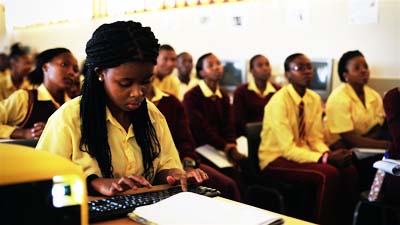
Video: Internet Broadcast Project
In April this year, the ICTISE (ICT Innovation in School Education) division won the first place at the Enterprise Video Awards held in Madison, Wisconsin, USA. Their Internet Broadcast Project (IBP) was the overall winner in the Innovation category – competing against universities and other training institutions from across the world.
The IBP is a collaborative project between the ICTISE and the Free State Department of Education (FSDoE). Broadcasting from the South Campus studio in Bloemfontein, teachers use specialised web-casting technology to present lessons that reach 68 education centres. Lessons cover a range of subjects and broadcast in real time to teachers and learners from Grades 8 to 12, covering 40 Free State towns, including the most rural areas.
Head of the ICTISE Project, Sarietjie Musgrave said, “Each participating school is equipped with 24/7 uncapped internet access, an all-in-one computer (computer, data projector and sound system), a document camera and a printer – the same equipment used in the studio by the expert teachers.
“The technology provided allows learners to communicate with the expert teacher in the studio during a broadcast to the school or learner at no cost. Lessons can be downloaded on to various devices and re-used during teaching time, shared with neighbouring schools, or taken home by learners to help with homework or for revision.
“To date, the IBP catalogue contains over 2 000 video lessons and during 2013 alone, the 68 schools accessed and used these videos 69 305 times. The project has the potential to reach more than 40 000 learners and 1 765 teachers every week.”
Innovation and sustainability form the backbone of this project. Support is provided to teachers and learners in Mathematics, Maths Literacy, Physical Science, Life Science, Geography, English, Accounting, Economics and Business Studies.
The ICTISE has a dedicated technical team to support schools. During broadcasts there is a dedicated helpline and on-site technical support, even in the remotest areas.